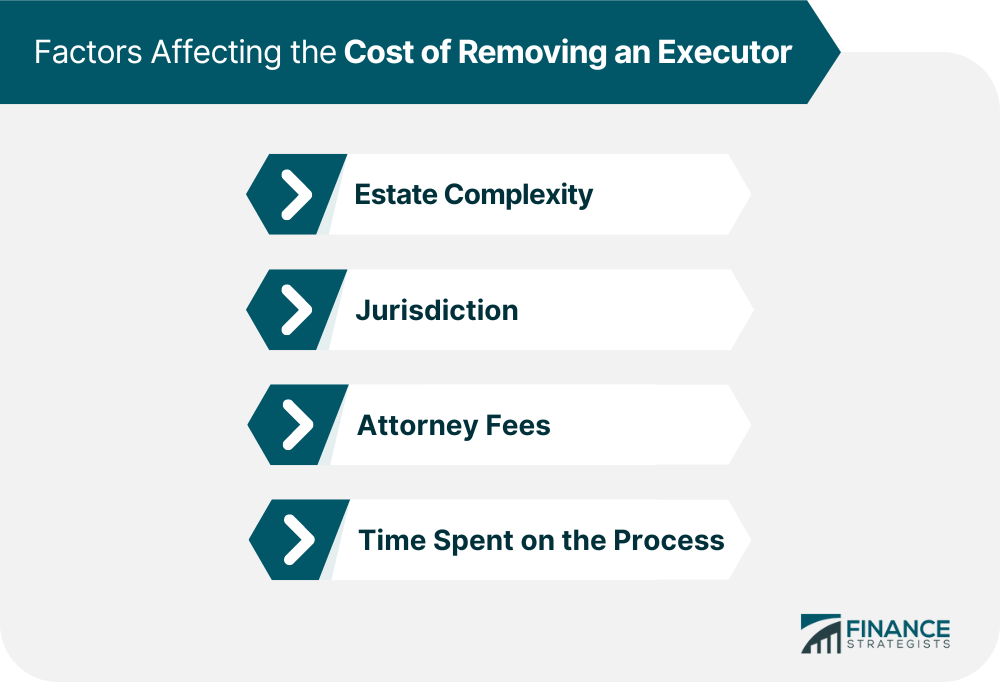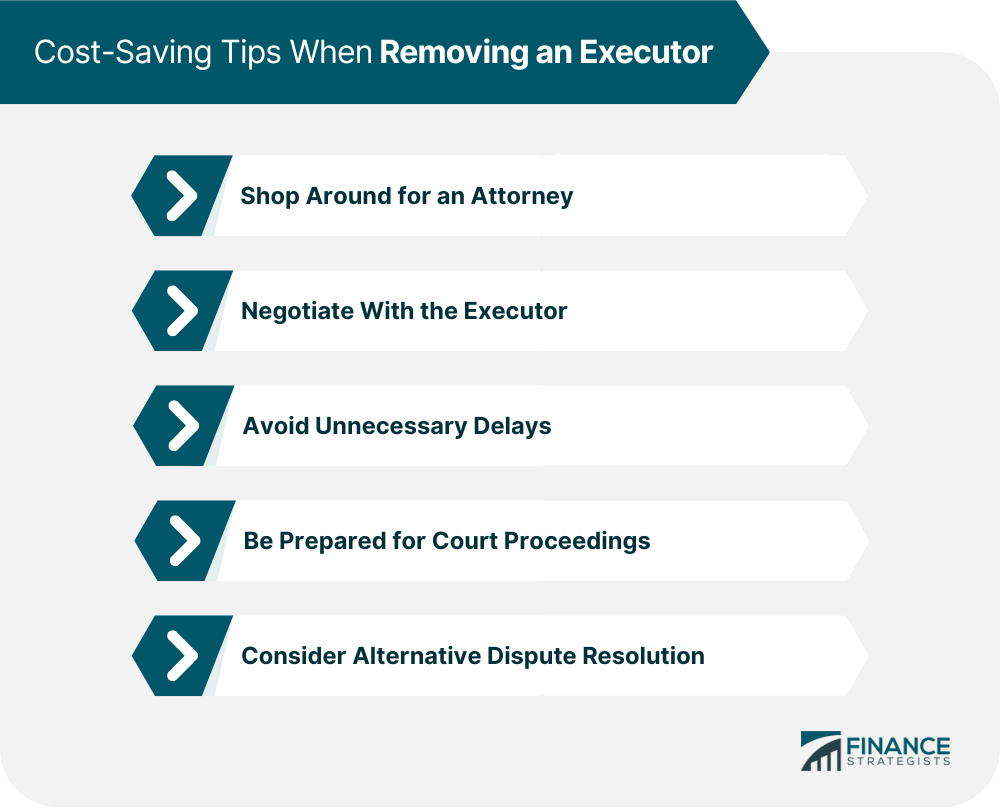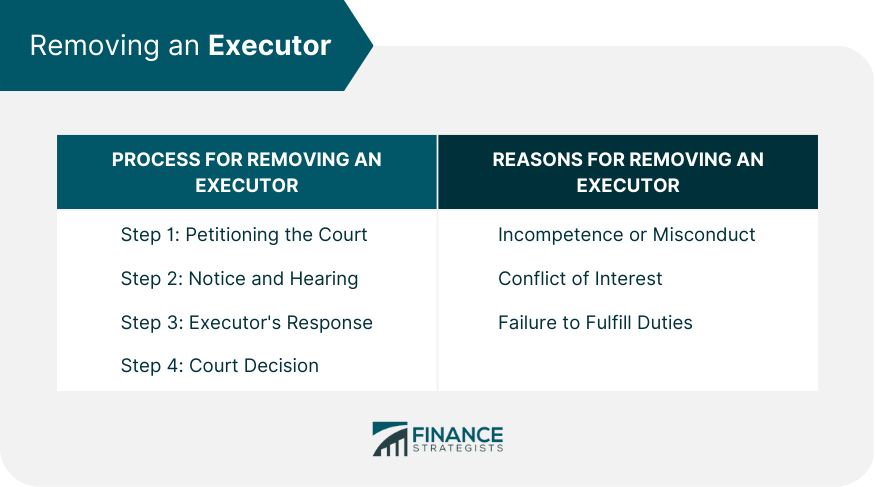An executor is an individual or institution appointed in a will to manage the deceased's assets, pay debts, and distribute the remaining assets to beneficiaries. The executor must act in the best interests of the beneficiaries and follow the instructions outlined in the will. When an executor fails to fulfill their duties, the beneficiaries may need to remove them. It is not an easy process, and it involves a court proceeding. The beneficiaries must file a petition in court requesting the executor's removal. The court then holds a hearing to determine whether the executor should be removed. The executor will have a chance to defend themselves and respond to the allegations of incompetence, misconduct, or breach of duty. If the court decides to remove the executor, a new one will be appointed. Legal fees may be incurred when an executor is removed from a will; these fees vary depending on the particular case, its complexity, and the executor's level of opposition. The costs of removing an executor can vary depending on various factors. Understanding these factors is crucial for beneficiaries who want to budget for the process and avoid unnecessary expenses. Here are some of the main factors that can affect the cost of removing an executor: It is the most significant factor that can affect the cost of removing an executor. If the estate has many assets, debts, and beneficiaries, the process may be more complicated and time-consuming, leading to higher legal fees and court costs. The executor's duties may also be more complex, requiring more time and effort to remove them from their position. In some cases, the beneficiaries may need to hire additional professionals, such as appraisers or accountants, to help with the process, which can increase the overall cost. Court fees and legal fees may vary from one state to another, and the laws and procedures for removing an executor may also differ per jurisdiction. Some states may require a bond to be posted before the executor can be removed, which can increase the overall cost. Fees can vary depending on the attorney's experience, the complexity of the case, and the particular region in which they practice. The beneficiaries may need to shop around to find an attorney who can provide quality services at a reasonable cost. Choose an attorney with experience with executor removal cases and who is familiar with the relevant laws and procedures. The longer the process takes, the higher the legal fees and court costs. The beneficiaries should work closely with their attorney to ensure the process is completed as efficiently and effectively as possible. They should provide all the necessary documents and evidence on time and avoid delays. Several ways can help beneficiaries save on costs when removing an executor: The beneficiaries should comb through different firms and legal offices to find an attorney who can provide quality services at a reasonable cost. They should compare the fees charged by different attorneys and choose the one that offers the best value for money. The beneficiaries should try negotiating with the executor to resolve the issues without going to court. If the executor is willing to step down voluntarily, the beneficiaries can save the costs associated with a court proceeding. Postponements, suspensions, and other delays in the process can increase legal fees and court costs. The beneficiaries should ensure that they provide all the necessary documents and evidence promptly and avoid unnecessary lags. The beneficiaries should be prepared for the court hearing and provide all the necessary evidence to support their case. They should work closely with their attorney to prepare a strong case and avoid any surprises during the hearing. In some cases, other resolution methods, such as mediation or arbitration, can be more cost-effective than going to court. The beneficiaries should consider these options if they are available and appropriate for their situation. Familiarizing with these steps is crucial for beneficiaries who want to ensure that the process is completed efficiently and effectively. The petition should explain why the executor should be removed and provide evidence to support the claim. The court will review the petition and determine whether sufficient cause exists to remove the executor. After the petition is filed, the court will schedule a hearing to consider the petition. The beneficiaries must serve notice on the executor, informing them of the hearing and the reasons for the petition. The executor can respond to the petition and present their evidence at the hearing. The executor may file a response to the petition explaining why they should not be removed. They may also present evidence to support their position. The beneficiaries must review the executor's response and evidence and prepare to counter them at the hearing. After considering all the evidence and hearing from both parties, the court will decide on whether to remove the executor. If the court favors the beneficiaries’ petition, it will appoint a successor executor to manage the estate. If the executor refuses to step down voluntarily, the court may issue an order to remove them. It is clear from the above that the decision to remove an executor entails costs and legal proceedings that should not be taken lightly. Here are some reasons to consider before taking action: If the executor is not performing their duties properly, or if they are engaging in misconduct, such as embezzlement or fraud, consider removing them. The beneficiaries must have evidence to support their claim and present it to the court. The executor should always act in the best interest of the beneficiaries. If the executor has a conflict of interest, such as a personal or financial interest in the estate, it may be necessary to remove them. If the executor fails to carry out their duties, for instance, by neglecting tasks like filing tax returns, paying off the deceased's debts, or distributing assets to beneficiaries, it might be time to move on and have them replaced. Removing an executor is not a decision that should be taken lightly, as it entails legal proceedings and costs that can quickly add up. The costs can vary depending on several factors, such as estate complexity, jurisdiction, attorney fees, and time spent on the process. It is essential to familiarize oneself with these factors to budget for the process and avoid unnecessary expenses. To save on costs, beneficiaries can shop around for an attorney, negotiate with the executor, avoid unnecessary delays, be prepared for the court hearing, and consider alternative dispute resolution. Removing an executor involves petitioning the court, notice and hearing, the executor's response, and the court decision. With the costs and process in mind, beneficiaries can choose to remove an executor based on misconduct, conflict of interest, or neglect of duties. In summary, removing an executor can be a complex process. Beneficiaries should seek professional advice from an estate planning lawyer before taking any action.Removing an Executor: Overview
How Much Does It Cost to Remove an Executor?
Factors Affecting the Cost of Removing an Executor
Estate Complexity
Jurisdiction
Attorney Fees
Time Spent on the Process

Cost-Saving Tips When Removing an Executor
Shop Around for an Attorney
Negotiate With the Executor
Avoid Unnecessary Delays
Be Prepared for Court Proceedings
Consider Alternative Dispute Resolution

The Process of Removing an Executor
Step 1: Petitioning the Court
Step 2: Notice and Hearing
Step 3: Executor's Response
Step 4: Court Decision

Should You Remove Your Executor?
Incompetence or Misconduct
Conflict of Interest
Failure to Fulfill Duties
The Bottom Line
How Much Does It Cost to Remove an Executor? FAQs
The cost to remove an executor will involve legal fees; these fees vary depending on the particular case, its complexity, and the executor's level of opposition.
Beneficiaries can save on costs when removing an executor by shopping around for an attorney, avoiding unnecessary delays, being prepared for the court hearing, and considering alternative dispute resolution methods, such as mediation or arbitration.
Factors affecting the cost of removing an executor include estate complexity, jurisdiction, attorney fees, and time spent on the process. Beneficiaries should understand these factors to budget for the process and avoid unnecessary expenses.
No, beneficiaries should not remove an executor solely based on the cost involved. They must have valid reasons, such as incompetence, misconduct, or breach of duty, to remove the executor. Beneficiaries should also seek professional advice before taking any action.
Yes, the cost of removing an executor can vary depending on the region. For instance, in New York, the cost can be as high as $25,000, while in some other states, the cost can be lower. It is important for beneficiaries to research the costs in their particular region and consult with an attorney who is familiar with the relevant laws and procedures.
True Tamplin is a published author, public speaker, CEO of UpDigital, and founder of Finance Strategists.
True is a Certified Educator in Personal Finance (CEPF®), author of The Handy Financial Ratios Guide, a member of the Society for Advancing Business Editing and Writing, contributes to his financial education site, Finance Strategists, and has spoken to various financial communities such as the CFA Institute, as well as university students like his Alma mater, Biola University, where he received a bachelor of science in business and data analytics.
To learn more about True, visit his personal website or view his author profiles on Amazon, Nasdaq and Forbes.











